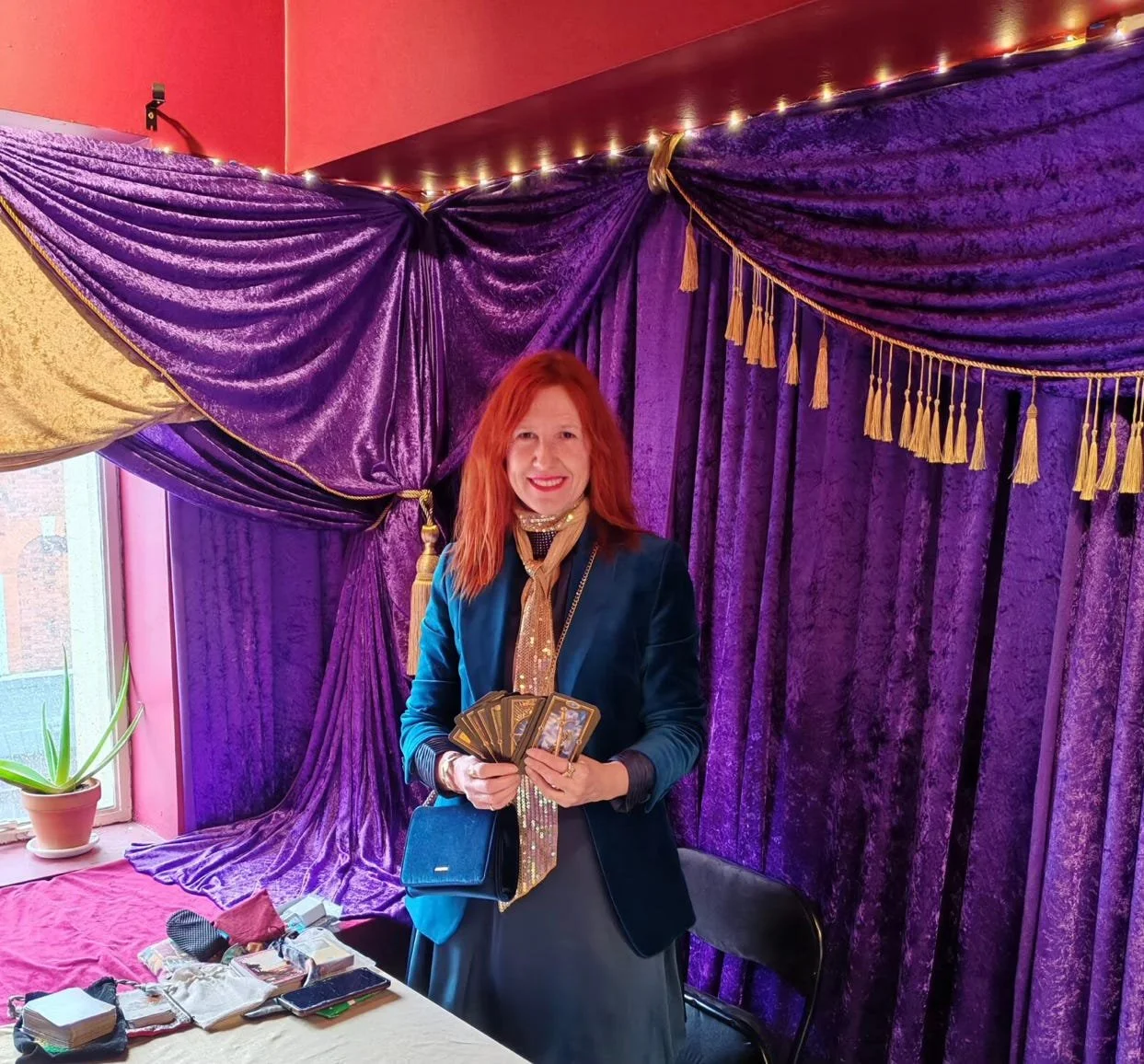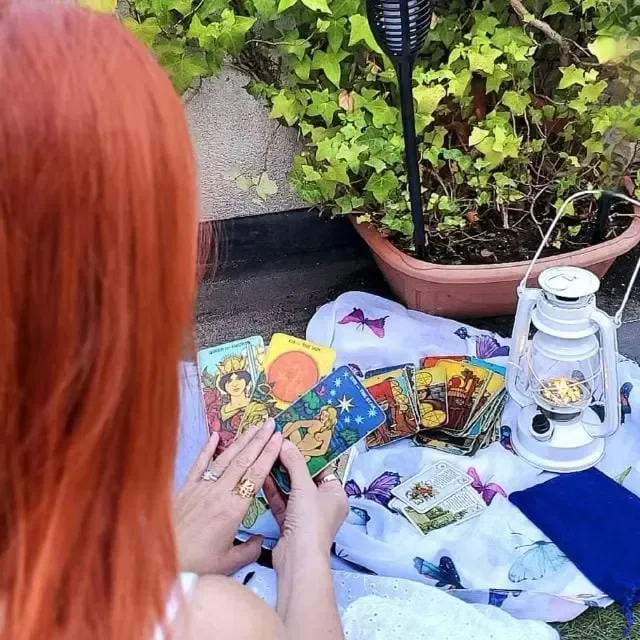‘Summoning Up the Silver’: Can You Really Magic Money Out of Thin Air?
Morgan le Fay, by Frederick Sandys (Image credit: public domain)
Mapi has an ordinary office job, working for the London Underground, where she has worked for the past 20 years. ‘It’s just a way for me to pay my bills, it’s not my life’s calling,’ she explains. Her ‘calling’ is the tarot: illustrated playing cards traditionally used for fortune-telling. Every Saturday, Mapi sets up shop at Alfie’s Antique market in Marylebone and reads cards for paying customers.
Mapi discovered tarot as a teenager, and started charging for readings a decade ago. Today, she’s busier than ever. She’s not the only spiritual practitioner in demand. Teacher, author and clairvoyant, Edwin Courtenay, is inundated with work; a popularity that is partly a reflection of the west’s shift in cultural attitudes. When Courtenay first started out at the College of Psychic Studies he wasn’t allowed to label himself a witch, ‘but’, he says, ‘it’s becoming an appealing title now.’
Mapi at her stall in Alfies Antique Market (image credit: Alfies Antique Market)
A lot has been written about the revival of religion and witchcraft, and the widespread societal disillusionment that birthed it. But as new audiences are initiated into the old ways, another question lingers: if spiritual practitioners can truly do magic, why do they need to work at all? Can’t they use their abilities to manifest a fortune and retire to a sun-soaked isle?
If spiritual practitioners can truly do magic, why do they need to work at all?
‘Some do,’ says Laura*, who has been working and practicing in esoteric circles for over 35 years, ‘You just wouldn’t hear about it. They would hide from publicity at all costs.’ She goes on to caveat that for most spiritual people, material wealth doesn’t hold the same sparkle it does for us more earthly folk. ‘Alternate realities, mystical experiences, love and faith all enrich one’s life in a powerful way. Money pales in comparison.’
Still, most full-time practitioners do need an income. Carla* is the proprietor of a shamanic and spiritual retreat, where healers come from all over the world to perform rituals and host workshops. Carla is not a practioner herself, and in setting up her centre she’s taken on an unexpected (and unofficial) role: financial advisor to shamans.
‘If I could manifest winning the lottery tomorrow, I wouldn't work again… I would spend my time shopping for handbags’
‘I’ve found they have a very strange relationship with money,’ she explains. ‘When they have money, they give it away, they share it among themselves and end up with nothing. Many of them have no capacity for saving; they don’t see it as important.’
Still, most full-time practitioners do need an income. Many of the healers and lightworkers who come to Laura’s centre are based in remote locations, such as the Brazilian jungle. They charge for their services in part to cover the costs of plane tickets and other expenses, and they are often joined by family members, who assist in the ceremonies.
Edwin Courtenay, teacher, author and clairvoyant (image credit: Edwin Courtenay)
Currently, Laura has a shamana staying who brought an entourage of relatives to act as chanas (shamans in training), complete with a 10-month-old baby. It’s a job with large outgoings, and when accompanied by a predisposition for poor financial management, sometimes requires the need to, quite literally, magic money out of thin air.
‘If I could manifest winning the lottery tomorrow, I wouldn't work again… I would spend my time shopping for handbags’, jokes Edwin Courtenay. He sees money as energy, and believes that energy is limitless… in most cases, anyway. ‘We can have presdispotions, paths in life that we cannot control. They may be self-erected psychological barriers, perhaps due to the value we attribute to ourselves, or the class we grew up in. Or, even more incomprehensibly, we could be limited by karmic factors. Choices made before incarnation in this life might prevent us from accessing money.’
Courtenay believes it is this latter factor which prevents him being able to conjure up a fortune. ‘I’m only able to generate a certain amount of money – enough to live a good life, but not enough to never work again.’ He sees it as a ‘contract’ his soul made, and, while he ‘offers to lend a magical hand’ for friends and family if they’re struggling, he believes he was put on this earth to teach and heal people, not to continuously summon up silver.
‘If you take on too much work you may rake in lots of money for a time, but there’s a danger of burning out’
Granted, magically invoking a windfall is an unusual business model – much easier to charge through the nose. Dr Kate Tomas, who also performs tarot and physic readings fulltime, told journalist India Rakusen, ‘I love money, and I love making money. I think that as long as it’s ethical and truly empowering to the people that you work with, there’s not a problem [with charging for services]’.
Mapi with her deck of tarot cards (image credit: @mapitarotreader)
But sky-high prices touch a nerve with other spiritual practitioners. While there is a firm consensus that all forms of magical service are work and therefore ought to be compensated, a prevalence of con artists in the industry leaves Courtenay wary. ‘If you’ve got a big reputation there’s the temptation to charge more because you can. But I think, in London, £250 should be the top-end.’
‘As a spiritual practitioner, you tread upon fine lines between this reality and the energies which surround and influence it. If you charge a lot of money for a reading, that’s a lot of energy. If a reading is inaccurate, or you’re not able to deliver upon your claims, and you subsequently feel guilty for misrepresenting yourself, that’s bad karma. It’s going to come back and bite you on the bum.’ He also explains that any spiritual work, when done properly, requires intense focus. ‘If you take on too much work you may rake in lots of money for a time, but there’s a danger of burning out and diluting your abilities.’
Mapi, because of her London Underground day job, is free of any temptation to overcharge. A 30 minute session with her would set you back only £30; it’s a competitive rate, and you’d be hard pressed to find a more reasonable reading in London. For those new to tarot, she even does a ten-minute ‘introductory’ reading for a tenner.
If we are paid highly enough for a skill or talent, we’re happy to grind ourselves into the ground.
‘I want to make my work accessible’, she shares, ‘people feel they’re working hard for little reward, they’re sad about the state of the world and that’s why they are turning to tarot. I don’t want to exploit these feelings by charging a lot, or limiting access to my services.’ She also gets something beyond monetary recompense in return. ‘Even though I work six days a week total, I’m never tired because I have something profound that gives my life purpose.’
Brazilian chanas (shamans in training) in ceremonial clothes
For the hardened sceptic, a ‘karmic contract’ might be a hollow excuse for why the magically endowed are not sitting on a pile of filthy lucre. But, whether you identify as spiritual or not, the relationship between money and ‘energy’ speaks to the universal human condition – one of infallibility and imperfection. Acknowledging that there are limits to what we are able to achieve is frustrating, and barriers we often find ourselves pushing hard against.
If we are paid highly enough for a skill or talent, we’re happy to grind ourselves into the ground, never thinking that we’re burning up the very qualities that make us ‘valuable’. Whether we find ourselves to be clairvoyant or not, we all possess a bandwidth and a tipping point. What these practitioners have achieved, albeit in different ways, is something almost more elusive than magic: balance. And it’s probably more conducive to a successful career than witchcraft.
IF YOU DO WANT TO MANIFEST MONEY… HERE’S A LITTLE SPELL
We’d be poor journalists if we didn’t ask our interviewees for a money spell. Here’s an easy one from Edwin Courtenay. We hope it brings you a tidy little sum.
1. Get six coins, because six is a number which is to do with abundance and growth. They can be one pence, five pence, whatever loose change you have around.
2. Get a plant pot, bury those coins at the bottom, underneath some earth and plant seeds you know grow easily and quickly, cress, for example.
3. Then you would call upon the Archangel Uriel, the angel of the earth element, and therefore the angel of physical energy and money.
4. Ask him to bless the seeds, so that as the seeds grew and the plant became more abundant, it would bring money into your life.
5. Make sure that the plant is nice and watered and it's in a sunny space and it's growing well.
‘If it doesn't grow well, then the spell is not working, because the principle is that as the seeds grow, they kind of pull the money at the bottom of the pot plant out into the world and into your life. You don't need to anticipate how, the money will come to you, but keep your eyes and ears open for it coming in, because it can come in different ways, a windfall, a new job, somebody giving you a bit of money for your birthday. You can specify the amount absolutely you can but be a bit realistic – think £300, not £30 million. Anyway, it’s a nice little spell, and I find people have had really good responses’ – Edwin Courtenay.
Take a look at Edwin’s website to find out more about his readings and courses
Visit Mapi’s website or Instagram to find out about her readings





